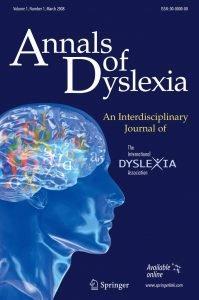Artigo Científico – A Hipótese do Duplo-Défice da Dislexia numa ortografia de opacidade intermédia

Foi publicado na revista científica Annals of Dyslexia (revista da IDA – International Dyslexia Association) um artigo intitulado: “Investigating the double-deficit hypothesis of developmental dyslexia in an orthography of intermediate depth“. Neste estudo, desenvolvido por Octávio Moura, Marcelino Pereira, Joana Moreno e Mário R. Simões, foi investigado a hipótese do Duplo-Défice na Dislexia em crianças portuguesas.
Poderá aceder ao artigo científico e ao seu resumo/abstract a partir do seguinte link:
https://link.springer.com/article/10.1007%2Fs11881-020-00190-1
Resumo / Abstract:
The present study aimed to investigate the double-deficit hypothesis (DDH) in an orthography of intermediate depth. Eighty-five European Portuguese-speaking children with developmental dyslexia, aged 7 to 12, were tested on measures of phonological awareness (PA), naming speed (NS), reading, and spelling. The results indicated that PA and NS were not significantly correlated, and that NS predicts reading fluency (but not reading accuracy and spelling) beyond what is accounted for by PA. Although the majority of the children with developmental dyslexia have double deficit (62.4%), some children have a single phonological deficit (24.7%) or a single NS deficit (8.2%). Children with a double deficit were not more impaired in reading fluency, reading accuracy, and spelling than both single-deficit subtypes. In conclusion, the findings of the present study are partially consistent with the DDH and provide evidence for the multifactorial model of developmental dyslexia. Implications of the DDH for an orthography of intermediate depth are emphasized.
Keywords: Developmental dyslexia, Double-deficit hypothesis, Naming speed, Phonological awareness.
